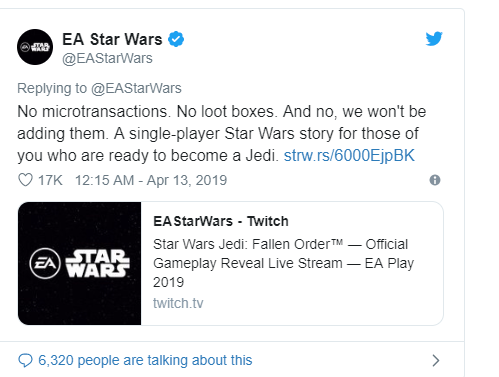As the war against loot boxes continues to heat up here in the US, game publishers still in the fight to keep them around are becoming increasingly desperate. Their refusal to budge on the topic of whether these practices are predatory or detrimental to the hobby has forced governments to step in and decide for them, with with a bill in the US outlining their negative effects currently receiving bipartisan support, and an increasing number of countries flat out declaring their inclusion illegal.
The growing scrutiny surrounding this topic has now made its way to the UK, with a recent hearing held before Parliament’s Digital, Culture, Media, and Sport Committee. While companies such as 2K and Epic have chosen to either disagree with the assertion that they’re similar to gambling, or simply deny the purpose of these mechanics in their games, I think we may have just encountered the most novel defense of them yet.
Kerry Hopkins, VP of legal and government affairs at EA, was clearly out of her depth as she made a desperate attempt to sidestep every question that was asked of her. When prodded on whether she thought the implementation of loot boxes was ethical, she immediately retorted with the notion that EA doesn’t call them loot boxes at all, and amidst a series of dry chuckles, said that they instead consider them “surprise mechanics” that they “have found everyone enjoys” them.
Surprise mechanics. Similar to the way Bethesda tried earlier this year to call pay-to-win mechanics in Fallout 76 “shortcuts”, or Activision labeling their paywalls via in-game microtransactions as “recurrent user spending”, here, we have EA trying to label one of the industry’s most controversial and insidious tactics as something else in order to make them acceptable.
They are not.
Before I take a moment to unpack the sheer ludicrousness of that statement, I have to refer to a tweet EA made last year while promoting Anthem:
Furthermore, I could’ve sworn that just a month ago, in preparation for their new Star Wars game, Star Wars Jedi: Fallen Order, this tweet went out as well:
Let’s just agree to call them loot boxes. Clearly, EA has no problem doing so when it’s to their benefit.
Hopkins then goes on to compare them to the inexpensive toys you find in your local grocery store, like Kinder eggs, or LOL Surprise toys. Items that are purchased with the assumption that you don’t know what you’re getting inside at the point of sale. Unfortunately, this comparison only works if, upon purchasing a Kinder egg, there’s ANOTHER egg inside that requires additional money before you access the prize inside. Or, pretend for a moment, that there’s a chance there could be nothing inside it, or that it could contain a few pieces of lint that have zero value.
This is precisely how “loot boxes” work in games, and EA is very aware of this, given how much these systems have played into their bottom line over the past few years. During this console generation, fans of EA’s franchises have had to watch in dismay as every single game in their lineup was cannibalized for the sake of adding gambling-like mechanics, making what were previously skill and merit-based rewards completely up to chance.
This was done in the name of halting the progression of each game, and stifling player choice, with the hopes that you will become frustrated enough to view spending additional money as your only alternative. Because each chance is random, the rush a player could potentially feel when obtaining a sought-after item lends the game an addictive quality that is not unlike what a gambler feels when running slots in a casino. To imply that they were implemented ethically, and with player enjoyment in mind is a desperate farce that reaches beyond the boundaries of logic and reason.

The fact that these products are regularly enjoyed by children, who don’t know or perhaps, can’t even tell that they’re being preyed upon, or people who already have addictive tendencies just makes the practice far worse. We’ve all heard the story about the child who spent over a thousand dollars unbeknownst to his parents on The Simpsons Tapped Out, or the guy who found out he’d spent over $10,000 on FIFA Ultimate Team over the course of two years. To add to with a personal anecdote, I had my Xbox Live account compromised while on vacation, only to find out that the person who’d emptied my debit account did so in order to buy FIFA packs. Does that sound like a “fun” and “enjoyable” culture EA is cultivating around their games?
Call me crazy, but I’m sure the “surprise mechanics” players have been forced to endure while trying to enjoy their games were anything but. I don’t think UFC fans who bought the third installment in the series were pleasantly surprised to find out that they had to roll in order to unlock new fighting moves. Need for Speed players who purchased the ironically titled Payback weren’t exactly elated to find out that the path to unlocking new car parts came down to rolling a literal slot machine.
While it’s easy to understand that many companies have adopted this practice in the name of unbelievably high profits, EA should’ve at the very least kept this practice limited to games intended for adults, instead of trying to peddle it to anyone with access to a wallet, including children. Now that countries such as Belgium and the Netherlands have unequivocally declared them as gambling, and we have studies proving how psychologically manipulative they are, EA has to rightfully sleep in the bed they’ve made for themselves as this unsustainable growth they’ve engaged in now threatens to strangle them from a legal standpoint.
To imply that [loot boxes] were implemented ethically, and with player enjoyment in mind is a desperate farce that reaches beyond the boundaries of logic and reason.
The unbelievable greed that saw Star Wars Battlefront 2 as a center of controversy through late 2018, along with the company’s new tactic of towards advertising the lack of them in their newer games as a “feature” points the smoking gun entirely at them, and them alone. Worse, the Entertainment Software Association, gaming’s only current regulatory body saw fit to be complicit in their implementation and distribution, despite growing complaints from the public because the profit was far too great to let go.
To try and rebrand them as something else in the hopes of continuing to exploit their audiences is going to do nothing but continue to raise red flags, and they know they’re standing on shaky ground even as they continue to make their arguments. At one point during the hearing, Kerry has a slip and says: “I have no qualms that they are implemented in an unethical way.”
This is a mess that will only grow with time, because EA has proven again and again that they can’t police themselves. Now that governments are getting involved, the consequences are becoming dire, and EA trying to foolishly rebrand their cash cows as “surprise mechanics” is not only an insult to anyone with intelligence, but will only force lawmakers to look further into them and force regulation, as it’s clear that EA is more concerned with their profits than the industry as a whole.




